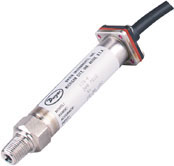|
|
|
|
The products listed represent only a small selection of the available IPS product line.
To discuss your specific application with an experienced technician.
Please Call 618-465-7623
|
 |
Dwyer Series 638 Pressure Transmitter (FM Approval)
Discontinued
|
|
Please Call 1-618-465-7623 for a Quote on this product!
|
|
Description
|
|
Series
638 Pressure Transmitter
Ranges
to 10,000 PSI
0.50%
Full Span Accuracy, 4-20 Ma Signal
|
Series 638 Pressure
Transmitters
employ a polysilicon sensor for superior longterm stability and
repeatability with ±0.5% accuracy. They are FM approved intrinsically
safe. Stainless steel NEMA 4X enclosure is ideal for corrosive media in
hazardous environments. Output is 4-20 mA with 10-30 VDC power supply.
NIST traceability with calibration certification is standard.
The 638 Series Pressure Transmitter is ideal corrosive media in harsh
environments! |
FEATURES:
-
Service:
Liquid, Gas or vapor
-
Process Connection:
1/8" male NPT
-
Wetted Material:
17-4 PH SS
-
Accuracy: ±0.50% FS
-
Temperature Limits:
-20 to 180°F
-
Pressure Limits:
2X Maximum range
-
Supply Voltage:
10 to 30 VDC
-
Output:
4 to 20 ma 2-wire
-
Zero and Span
Adjustment: Adjustable
-
Enclosure:
Stainless Steel and Valox
-
Conduit Connection: 1/4" - 18 Knockout
-
Designed to meet NEMA 4X
|
The 638 Series Pressure Transmitter |
|
Standard 638 Models. |
638 Models - FM Approval |
|
|
|
| The Standard 638 Model is more ecnomical! |
|
|
A Little Bit About Using Zener Barriers and Galvanic
Isolators |
|
The MTL5041/5045 Galvanic
Isolators provide
total intrinsically safe isolation for communication with Dwyer® pressure
transmitters approved for location in hazardous areas. Galvanic
isolation eliminates the need for a high integrity earth ground required
when using shunt diode type safety barriers. DIN rail mounting and
plug-in signal and power connectors simplify installation and maintenance.
Compatible Models:
637, 638, 639, 608, 2200, 2900
|
|
The
MTL7706/7787 is
an intrinsically safe (IS) shunt-diode barrier that can be used to
communicate with and provide isolations for certain Dwyer® transmitters
approved for use in hazardous areas. These barriers limit the amount of
energy allowed to pass into the hazardous area, which inhibit ignition in
flammable atmospheres. Requires high integrity earth ground
Compatible Models: 637,
638, 639, 608, 2200
|
|
What is a Good ground resistance value? |
|
There is a good deal
of confusion as to what constitutes a good ground and what the ground
resistance value needs to be. Ideally a ground should be of zero ohms
resistance.
There is not one standard ground
resistance threshold that is recognized by all agencies. However, the NFPA
and IEEE have recommended a ground resistance value of 5.0 ohms or less.
The NEC has stated to Make sure
that system impedance to ground is less than 25 ohms specified in NEC
250.56. In facilities with sensitive equipment it should be 5.0 ohms or
less.
The goal in ground resistance is to
achieve the lowest ground resistance value possible that makes sense
economically and physically.
|
|
|
|
Home
| About | Contact |
Ordering Info |Thermocouples
|
|

©
2003-2009 Industrial Process and Sensor. All rights reserved.
All product names throughout this website are trademarks of their respective holders.
|


